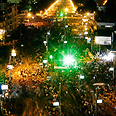
Cairo protesters: 'Jan. revolution all over again'
Millions demonstrating all across Egypt against Morsi regime. Medical officials say four killed in clashes between supporters, opponents of Islamist president. 'People demand change,' Tahrir Square protester says
Hundreds of thousands of opponents of Egypt's Islamist president poured out onto the streets in Cairo and across much of the nation Sunday, launching an all-out push to force Mohamed Morsi from office on the one-year anniversary of his inauguration. Fears of violence were high, with Morsi's Islamist supporters vowing to defend him.
Security and medical sources said at least four people were killed in Egypt and nearly 200 wounded on Sunday in clashes between supporters and opponents of Islamist president Morsi.
All four dead were shot in Nile Valley towns south of Cairo, one in Beni Suef and three in Assiut. Across the country, the Health Ministry said, 174 people were given medical treatment as a result of factional fighting in the streets.
Interior Ministry officials told Sky News in Arabic that some three million people were demonstrating across the country.
Related stories:
- Op-ed: Don't count on Egypt
- Israeli flag burned as protests sweep Egypt
- Jewish American student killed in Egypt violence
Hundreds of people throwing petrol bombs and rocks attacked the national headquarters of Mursi's Muslim Brotherhood. The building caught fire as guards and protesters exchanged gunfire.
Waving Egyptian flags and posters of Morsi crossed out in red, crowds packed central Cairo's Tahrir square, the birthplace of the 2011 uprising against autocrat Hosni Mubarak, thunderous chants of "erhal!", or "leave!" rang out.
At the same time, tens of thousands marched from points around Cairo, heading toward Tahrir and toward Morsi's Ittihadiya presidential palace in another part of the city. The crowds, including women, children and elderly people, hoisted long banners in the colors of the Egyptian flag and raised red cards - a sign of expulsion in soccer.
Video courtesy of jn1.tv
With protesters from a range of social and economic levels in a festive atmosphere, the crowds resembled those from the 18 days of protests against Mubarak - a resemblance the protesters sought to reinforce, chanting the slogan from that time: "The people want to topple the regime."
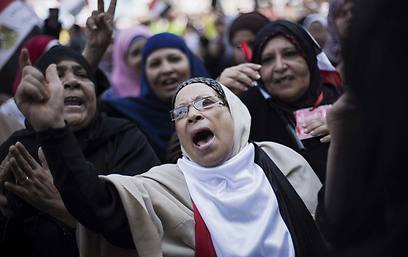
Photo: AP
Some carried tents, planning to camp in Tahrir or outside the palace. Residents of nearby buildings sprinkled water down on the marchers to cool them in the punishing summer heat and waved flags and blew whistles in support.
Giza resident Himda Hamdi Abu Sayef, 27, went to Tahrir Square after work. "There is a great presence of people, including women, but there are no incidents of sexual harassment like in the past," she told Ynet despite a report saying that a foreign journalist was raped at the square a few days ago while she was covering a demonstration.
"The protest is very organized. The army and police are not intervening, and I don't think they will as long as there is no violence," she said, adding that Morsi supporters cannot be seen in the area.
Abu Sayef said Sunday's protests "are very similar" to the demonstrations that led to the ouster of former President Hosni Mubarak. "I will keep coming to the square until Morsi falls."
Muhammad Majdi Hanfi, a 20 year old resident of Cairo, is an Israel affairs editor at the Al-Dustour newspaper. "It is a repeat of the January 25 revolution," he told Ynet by phone. "Everyone is calling to overthrow Morsi. The current regime is acting just like Mubarak's regime. There is no change on policy, and the people demand something new."
Near Ittihadiya palace, thousands of Islamists gathered in a show of support for Morsi outside the Rabia al-Adawiya Mosque. Some Morsi backers wore homemade body armor and construction helmets and carried shields and clubs - precautions, they said, against possible violence.
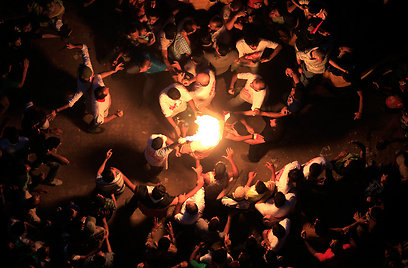
Cairo, Sunday night
The spokesperson of Egypt's Presidential Palace, Ehab Fahmy, said Morsi's message was "the presidency is open to a real and serious national dialogue."
He added there was no alternative to dialogue in resolving the differences between the Muslim Brotherhood-backed leader and the public. The spokesperson also said the rumors that Morsi was about to step down and hand the rule over to the army were untrue.
There is a sense among opponents and supporters of Morsi that Sunday is a make-or-break day, hiking worries that the two camps will come to blows, even as each side insists it won't start violence. Already at least seven people, including an American, have been killed in clashes the past week, mainly in Nile Delta cities and the coastal city of Alexandria.
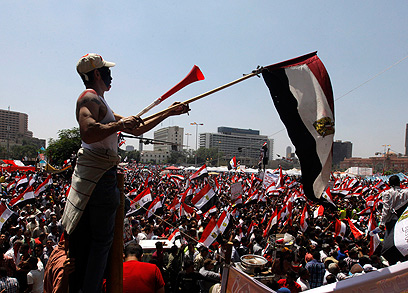
Photo: AP
The demonstrations are the culmination of polarization and instability that have been building since Morsi's June 30, 2012 inauguration as Egypt's first freely elected leader. The past year has seen multiple political crises, bouts of bloody clashes and a steadily worsening economy, with power outages, fuel shortages, rising prices and persistent lawlessness and crime.
In one camp are the president and his Islamist allies, including the Muslim Brotherhood and more hard-line groups. They say street demonstrations cannot be allowed to remove a leader who won a legitimate election, and they accuse Mubarak loyalists of being behind the campaign in a bid to return to power. They have argued that for the past year remnants of the old regime have been sabotaging Morsi's attempts to deal with the nation's woes and bring reforms.
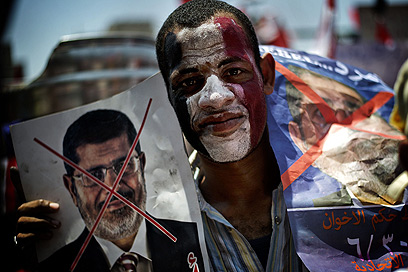
Photo: AFP
Hard-liners among them have also given the confrontation a sharply religious tone, denouncing Morsi's opponents as "enemies of God" and infidels.
On the other side is an array of secular and liberal Egyptians, moderate Muslims, Christians - and what the opposition says is a broad sector of the general public that has turned against the Islamists. They say the Islamists have negated their election mandate by trying to monopolize power, infusing government with their supporters, forcing through a constitution they largely wrote and giving religious extremists a free hand, all while failing to manage the country.
The opposition believes that with sheer numbers in the street, it can pressure Morsi to step down - perhaps with the added weight of the powerful military if it signals the president should go.
"Today is the Brotherhood's last day in power," said Suliman Mohammed, a manager of a seafood company who was protesting at Tahrir, where crowds neared 100,000 by early afternoon.
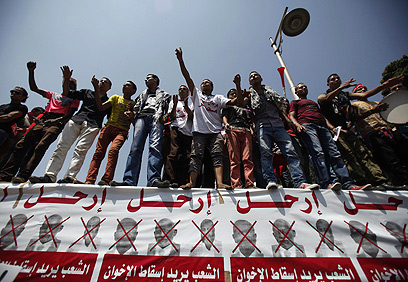
Photo: Reuters
"I came here today because Morsi did not accomplish any of the (2011) revolution's goals. I don't need anything for myself, but the needs of the poor were not met."
Another Tahrir protester, 21-year-old Mohammed Abdel-Salam, said he came out because he wanted early presidential elections. "If he is so sure of his popularity why doesn't he want to organize early elections? If he wins it, we will tell the opposition to shut up."
Underlining the potential for deadly violence, a flurry of police reports on Sunday spoke of the seizure of firearms, explosives and even artillery shells in various locations of the country, including Alexandria and the outskirts of Cairo. Sunday afternoon, two offices belonging to the Brotherhood's Freedom and Justice party, were attacked and ransacked Sunday by protesters in the city of Bani Suef, south of Cairo.
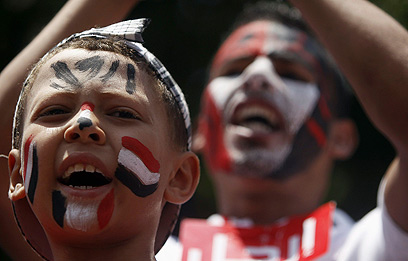
Photo: Reuters
In an interview published Sunday in The Guardian, Morsi - who has three years left in his term - said he had no plans to meet the protesters' demand for an early presidential election.
"If we changed someone in office who (was elected) according to constitutional legitimacy - well, there will (be) people or opponents opposing the new president too, and a week or a month later, they will ask him to step down," Morsi told the British daily.
"There is no room for any talk against this constitutional legitimacy," he said.
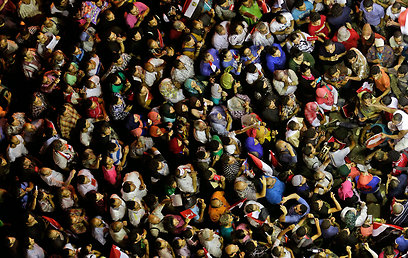
Photo: AP
Traffic in Cairo's normally clogged streets was light at midday as many residents chose to stay home for fear of violence or a wave of crime similar to the one that swept Egypt during the 18-day, anti-Mubarak uprising. Banks were closing early and most government departments were either closed for the day or were thinly staffed. Most schools and colleges are already closed for the summer holidays.
The opposition protests emerge from a petition campaign by a youth activist group known as Tamarod, Arabic for "Rebel." For several months, the group has been collecting signatures on a call for Morsi to step down.
On Saturday the group announced it had more than 22 million signatures - proof, it claims, that a broad sector of the public no longer wants Morsi in office.
It was not possible to verify the claim. If true, it would be nearly twice the around 13 million people who voted for Morsi in last year's presidential run-off election, which he won with around 52 percent of the vote. Tamarod organizers said they discarded about 100,000 signed forms because they were duplicates.
Morsi's supporters have questioned the authenticity and validity of the signatures, but have produced no evidence of fraud.
Adding to his troubles, eight lawmakers from the country's interim legislature announced their resignation Saturday to protest Morsi's policies. The 270-seat chamber was elected early last year by less than 10 percent of Egypt's eligible voters, and is dominated by Islamists.
A legal adviser to Morsi also announced his resignation late Saturday in protest of what he said was Morsi's insult of judges in his latest speech on Wednesday.
A week ago, with the public sense of worry growing over the upcoming confrontation, Defense Minister Gen. Abdel-Fattah el-Sissi last week gave the president and his opponents a week to reach a compromise. He warned that the military would intervene to prevent the nation from entering a "dark tunnel."
Army troops backed by armored vehicles were deployed Sunday in some of Cairo's suburbs, with soldiers, some in combat gear, stood at traffic lights and major intersections. Army helicopters flew over Cairo on several occasions on Sunday, adding to the day's sense of foreboding. The aircraft were loudly cheered every time they flew over Tahrir.
Morsi had called for national reconciliation talks in a Wednesday speech but offered no specifics. Opposition leaders dismissed the call as cosmetics.
Asked by The Guardian whether he was confident that the army would not intervene if the country becomes ungovernable, Morsi replied, "Very."
The Egyptian leader, however, said he did not know in advance of el-Sissi's comments last week.
AP, Reuters contributed to the report
- Receive Ynetnews updates directly to your desktop










